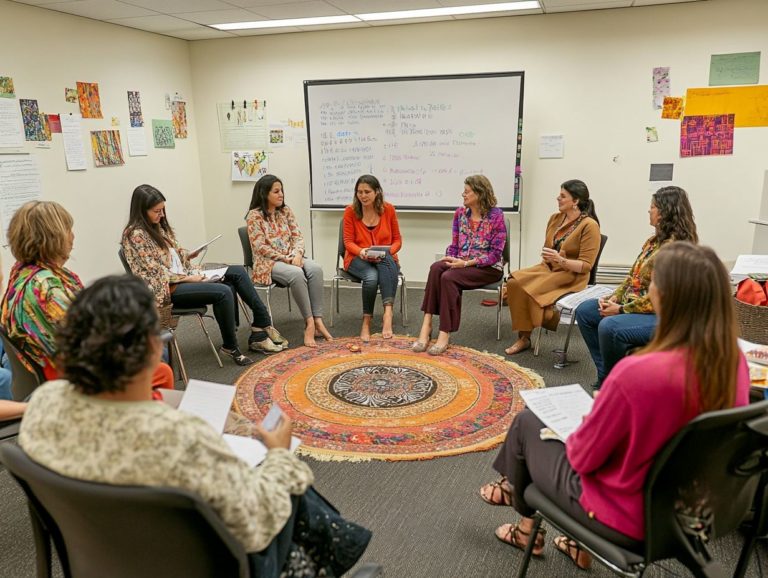37. The Benefits of Integrative Health for Families
Integrative health is increasingly celebrated as a holistic approach to well-being, seamlessly blending conventional medicine with alternative practices.
This methodology provides significant advantages for families, emphasizing not just improved overall health but also an enhanced quality of life.
You will explore practical strategies, including healthy eating, physical activity, and mental health techniques, thoughtfully designed for both children and parents.
Discover how these practices can cultivate a healthier, happier family dynamic while nurturing wellness for everyone involved.
Contents
Key Takeaways:

Integrative health offers a holistic approach to improving the overall health and well-being of families. By incorporating healthy eating, physical activity, and mental/emotional health techniques, families can experience an enhanced quality of life. For more insights, explore integrative health approaches for family wellness, which can benefit both children and parents, with age-appropriate techniques for children and stress management and self-care for parents.
Understanding Integrative Health
Understanding integrative health requires you to adopt a holistic perspective on wellness. This approach blends conventional medicine with additional treatments that work alongside traditional medicine to focus on whole-person care.
This approach not only addresses physical symptoms but also emotional needs and lifestyle factors, especially for older adults managing chronic conditions.
Effective treatments backed by research, like chiropractic care, acupuncture, and meditation, aim to elevate your health and well-being while thoughtfully addressing your unique health considerations.
Defining the Concept
Integrative health is a holistic approach that seamlessly blends conventional medicine with alternative therapies, all aimed at enhancing your overall well-being. This multifaceted practice doesn t just treat symptoms; it delves deep into the underlying causes of health issues.
Imagine weaving together techniques like massage therapy, acupuncture, and lifestyle medicine to create a comprehensive healing experience. This inclusive framework gives you the power to take an active role in your own healing journey.
For example, massage therapy can melt away tension and reduce stress. Acupuncture works to balance your energy flow and restore harmony within your body.
Incorporating lifestyle medicine further underscores the significance of nutrition, exercise, and mindfulness in your everyday life. Embracing an evidence-based approach is crucial, as it ensures the efficacy of these combined therapies is consistently validated.
This leads to safe and effective treatments tailored precisely to your unique needs.
Benefits of Integrative Health for Families
The advantages of integrative health for families reach far beyond conventional healthcare.
By embracing holistic wellness techniques, you can promote significant health improvements and elevate your quality of life, addressing both physical and emotional needs in a comprehensive manner.
Improved Overall Health and Well-being
Integrative health can transform your well-being into something extraordinary! It enhances your overall well-being by weaving together traditional and complementary therapies tailored specifically to your unique needs.
This holistic approach often embraces specific practices like Tai Chi, which fosters balance and mental clarity through gentle movements, and yoga, celebrated for its remarkable ability to improve flexibility and alleviate stress.
When guided properly by healthcare providers, dietary supplements can bolster various facets of your wellness, from supporting immune function to enhancing mental health.
Evidence from numerous healthcare professionals suggests that merging these practices enriches your healing journey. It also gives you the power to take charge of your health, creating a harmonious balance between mind and body.
Ready to improve your family’s health? Start your journey with integrative health today!
Enhanced Quality of Life

Enhanced quality of life stands out as a significant benefit of integrative health. This approach emphasizes personal care that eases physical symptoms and nurtures your mental well-being.
By using support and stress relief methods, you may find yourself better prepared to tackle daily challenges. These approaches highlight how wellness looks at the whole person, acknowledging that emotional well-being is intricately linked to your physical health.
Techniques like mindfulness, meditation, and therapeutic communication help relieve stress while cultivating resilience, giving you the power to engage more fully with your life.
The cumulative effect of these integrative practices establishes a strong foundation for sustained health and vitality. Ultimately, this leads to enhanced overall wellness and life satisfaction.
Integrative Health Practices for Families
Integrative health practices for families encompass a diverse array of strategies designed to enhance your family’s wellness. This includes embracing healthy eating habits, engaging in regular physical activity, and exploring integrative health practices for new parents.
Incorporating mental health techniques is essential, all tailored to promote holistic well-being for everyone in your household.
Healthy Eating and Nutrition
Healthy eating and nutrition serve as the cornerstones of integrative health. They highlight the crucial role of balanced diets and dietary supplements in your journey to well-being.
By embracing a diverse array of nutrient-dense foods, you can bolster your overall health. This significantly diminishes the risk of chronic diseases like diabetes, heart disease, and obesity.
Adhering to established dietary guidelines that champion whole grains, lean proteins, healthy fats, and an abundance of fruits and vegetables is vital. Making thoughtful nutritional choices nourishes your body and cultivates energy and vitality.
If you re looking to elevate your health, don’t hesitate to reach out to healthcare providers who can create a personalized dietary plan just for you! This ensures you achieve effective and sustainable health outcomes.
Physical Activity and Exercise
Physical activity and exercise hold a vital place in integrative health. They enhance not just physical fitness but also your mental resilience and emotional well-being.
Incorporating practices like yoga and Tai Chi into your routine can significantly amplify these benefits. This offers a harmonious balance between your body and mind.
For families, integrating these forms of exercise into daily life nurtures stronger physical health. It also cultivates a supportive atmosphere where everyone can flourish together.
Regularly engaging in such activities can help alleviate stress and boost concentration. It strengthens connections among family members.
By weaving movement into your everyday routines, you create a vibrant environment that promotes healthier lifestyle choices. Ultimately, this leads to holistic well-being for everyone involved.
Mental and Emotional Health Techniques
Mental and emotional health techniques are vital components of integrative health practices. They seamlessly blend strategies like meditation and stress management to elevate your emotional well-being.
These techniques are crucial in enhancing your family’s overall health care. They address the delicate balance between psychological resilience and emotional self-care.
Incorporating mindfulness into your daily routines helps you stay present. This diminishes anxiety while deepening your connection to your feelings.
Seeking counseling support can offer invaluable insights and coping strategies tailored specifically to the unique dynamics of your family. By collectively prioritizing these mental health strategies, you and your loved ones strengthen your interpersonal bonds.
This also cultivates an environment that fosters healing and growth, ensuring that both your mental and emotional needs are met with care and intention.
Integrative Health for Children

Integrative health for children emphasizes tailored practices that align with their developmental stages, as outlined in how integrative health can enhance spiritual wellbeing. This fosters physical, emotional, and cognitive growth.
This approach ensures they reap the maximum health benefits as they progress through their formative years.
Ultimately, integrative health promotes a vibrant, supportive environment for families to thrive together.
Age-Appropriate Practices and Benefits
When considering age-appropriate practices in integrative health for children, it s essential to embrace engaging activities and therapeutic approaches that resonate with their developmental stages.
Think of creative arts like painting and music, paired with invigorating physical play such as outdoor games and dance. These pursuits encourage emotional expression and stimulate cognitive growth.
Weaving nutrition education into daily routines helps instill healthy eating habits from an early age. These practices promote physical fitness, emotional well-being, and enhance social skills as children collaborate with their peers.
Nurturing these elements contributes significantly to the holistic health of children, guiding them on the path to becoming well-rounded individuals.
Integrative Health for Parents
Integrative health for parents underscores the significance of stress management and self-care practices, acknowledging that your well-being profoundly impacts your family’s overall wellness. For more insights, check out key takeaways for practitioners.
Managing Stress and Self-Care
Managing stress and prioritizing self-care are essential elements of integrative health for you as a parent. They allow you to maintain balance and well-being in your life.
Effectively managing your stress levels creates a harmonious home environment that fosters positive interactions and emotional stability among family members.
Mindfulness techniques help you focus on the present moment, enabling you to connect deeply with your children while reducing anxiety.
Incorporating breathing exercises promotes relaxation and sets a positive example for your kids in managing their own stress.
Implementing effective time management skills helps you prioritize quality family time, minimizing the rush of daily life and enhancing feelings of togetherness and support.
Supporting Family Health and Wellness
Supporting family health and wellness through integrative approaches means creating a nurturing environment that fosters physical, emotional, and mental well-being, as highlighted in the benefits of nature in integrative health.
You can achieve this by encouraging open communication among family members. This ensures everyone feels comfortable sharing their thoughts and feelings.
Engaging in shared activities like family walks, cooking healthy meals together, or participating in community events not only strengthens bonds but also opens the door for meaningful discussions about health and wellness.
Incorporating holistic practices such as mindfulness, meditation, or yoga enhances emotional resilience and fosters a harmonious atmosphere.
By combining these strategies, you cultivate a sense of belonging and support, ultimately leading to a healthier, happier family dynamic!
Frequently Asked Questions

What is integrative health?
Integrative health is an approach to healthcare that combines conventional medicine with alternative and complementary therapies, such as acupuncture, meditation, and herbal supplements.
How can integrative health benefit families?
Integrative health can benefit families by promoting overall wellness and addressing the physical, emotional, and spiritual needs of each family member. For children, the benefits of integrative health are particularly significant, as it can also help prevent and manage chronic health conditions.
What are some specific benefits of integrative health for families?
- Improved communication and relationships
- Increased energy and vitality
- Reduced stress and anxiety
- Better management of chronic health conditions
Are there any risks associated with integrative health?
As with any form of healthcare, there are potential risks associated with integrative health. Families should research and consult trained professionals to ensure they receive safe and effective treatments.
Can integrative health be used for children?
Yes, integrative health can be used for children with the guidance and supervision of a trained healthcare provider. It can be beneficial for children with chronic health conditions or for overall wellness and prevention, as discussed in the science behind integrative health practices.
Is integrative health covered by insurance?
Integrative health may be covered by some insurance plans, depending on the specific treatments and therapies being used. It s recommended to check with your insurance provider before seeking integrative health services.
Start integrating these practices today for immediate benefits!






